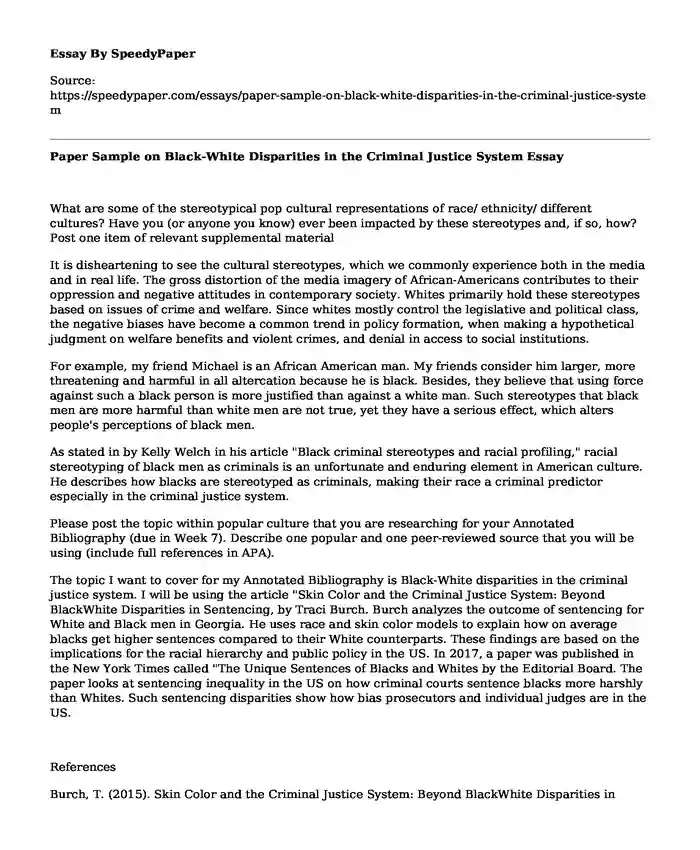
| Type of paper: | Course work |
| Categories: | Criminal justice |
| Pages: | 2 |
| Wordcount: | 489 words |
What are some of the stereotypical pop cultural representations of race/ ethnicity/ different cultures? Have you (or anyone you know) ever been impacted by these stereotypes and, if so, how? Post one item of relevant supplemental material
It is disheartening to see the cultural stereotypes, which we commonly experience both in the media and in real life. The gross distortion of the media imagery of African-Americans contributes to their oppression and negative attitudes in contemporary society. Whites primarily hold these stereotypes based on issues of crime and welfare. Since whites mostly control the legislative and political class, the negative biases have become a common trend in policy formation, when making a hypothetical judgment on welfare benefits and violent crimes, and denial in access to social institutions.
For example, my friend Michael is an African American man. My friends consider him larger, more threatening and harmful in all altercation because he is black. Besides, they believe that using force against such a black person is more justified than against a white man. Such stereotypes that black men are more harmful than white men are not true, yet they have a serious effect, which alters people's perceptions of black men.
As stated in by Kelly Welch in his article "Black criminal stereotypes and racial profiling," racial stereotyping of black men as criminals is an unfortunate and enduring element in American culture. He describes how blacks are stereotyped as criminals, making their race a criminal predictor especially in the criminal justice system.
Please post the topic within popular culture that you are researching for your Annotated Bibliography (due in Week 7). Describe one popular and one peer-reviewed source that you will be using (include full references in APA).
The topic I want to cover for my Annotated Bibliography is Black-White disparities in the criminal justice system. I will be using the article "Skin Color and the Criminal Justice System: Beyond BlackWhite Disparities in Sentencing, by Traci Burch. Burch analyzes the outcome of sentencing for White and Black men in Georgia. He uses race and skin color models to explain how on average blacks get higher sentences compared to their White counterparts. These findings are based on the implications for the racial hierarchy and public policy in the US. In 2017, a paper was published in the New York Times called "The Unique Sentences of Blacks and Whites by the Editorial Board. The paper looks at sentencing inequality in the US on how criminal courts sentence blacks more harshly than Whites. Such sentencing disparities show how bias prosecutors and individual judges are in the US.
References
Burch, T. (2015). Skin Color and the Criminal Justice System: Beyond BlackWhite Disparities in Sentencing. Journal of Empirical Legal Studies, 12(3), 395-420.
Editorial Board (17th Dec 2016). The Unique Sentences of Blacks and Whites. New York Times. Retrieved from: https://www.nytimes.com/2016/12/17/opinion/sunday/unequal-sentences-for-blacks-and-whites.html
Welch, K. (2007). Black criminal stereotypes and racial profiling. Journal of Contemporary Criminal Justice, 23(3), 276-288.
Cite this page
Paper Sample on Black-White Disparities in the Criminal Justice System. (2022, Jul 14). Retrieved from https://speedypaper.net/essays/paper-sample-on-black-white-disparities-in-the-criminal-justice-system
Request Removal
If you are the original author of this essay and no longer wish to have it published on the SpeedyPaper website, please click below to request its removal:
- Race and Class in Latin America, Free Essay
- Organizational Metaphors Essay, Free Example for You
- Free Paper Sample for Students: Taxation Law and Practice
- Free Essay Comprising Business Law Discussion on Licensing
- Is University Education General Education or Elite Education? Paper Example
- Essay Example. Rights and Responsibilities of Citizens
- Paper Example. Nurses burnout
Popular categories




